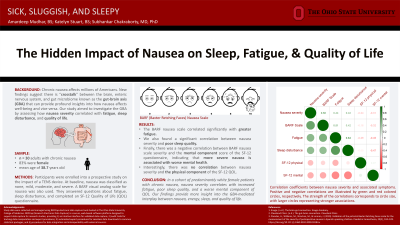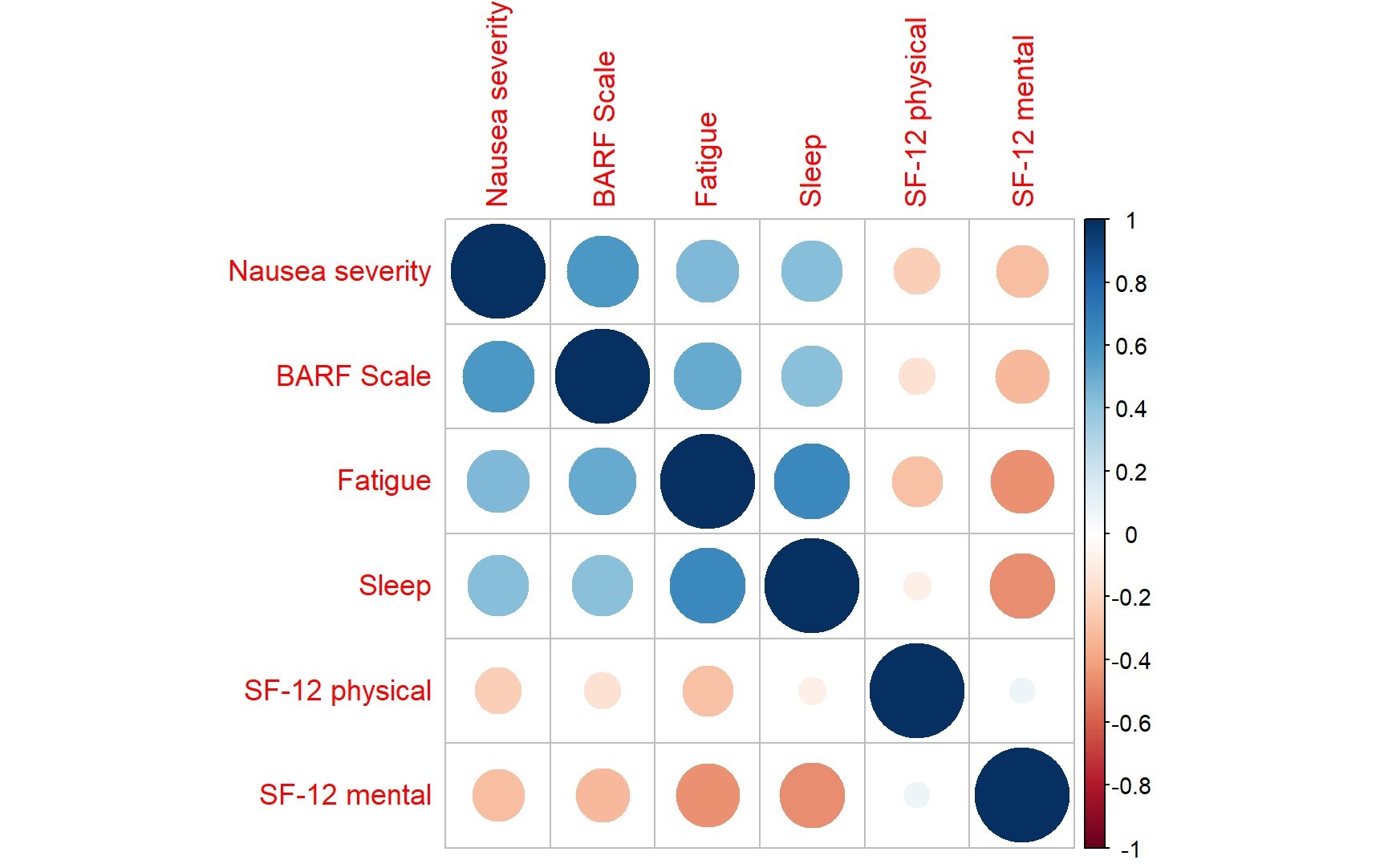Monday Poster Session
Category: Functional Bowel Disease
P2336 - Sick, Sluggish, And Sleepy: How Nausea Severity Correlates With Fatigue, Sleep Disturbance, and Quality Of Life
Monday, October 28, 2024
10:30 AM - 4:00 PM ET
Location: Exhibit Hall E

Has Audio
- AM
Amardeep Mudhar, MD
The Ohio State University College of Medicine
Columbus, OH
Presenting Author(s)
Amardeep Mudhar, MD1, Lauren Kanzaki, MD1, Katelyn Stuart, MD1, Subhankar Chakraborty, MD, PhD2
1The Ohio State University College of Medicine, Columbus, OH; 2The Ohio State University Wexner Medical Center, Columbus, OH
Introduction: Millions of Americans suffer from chronic nausea, which can severely impact quality of life. New findings suggest there is “crosstalk” between the brain, enteric nervous system, and gut microbiome known as the gut-brain axis (GBA) that can provide profound insights into how nausea affects well-being and vice versa. Our study aimed to investigate the GBA by assessing how nausea severity correlated with fatigue, sleep disturbance, and quality of life.
Methods: 30 adults proficient in English with nausea lasting > 2 months were enrolled into a prospective study on the impact of a TENS device. Cirrhosis, active cancer, IBD, implanted electronic devices, carpal tunnel, recent facial trauma/surgery, or history of brain tumor, stroke, encephalitis, or meningitis were exclusionary criteria. At baseline, participants classified their nausea as none, mild, moderate (controlled with medications), and severe (uncontrolled with medications). A BARF visual analog scale for nausea was also employed. They answered questions about fatigue, sleep disturbance, and completed an SF-12 Quality of Life (QOL) questionnaire. We present results of analysis of the baseline surveys.
Results: Of the 30 participants, 83% were female, 97% were white, and the mean age was 38.7 years. There was a statistically significant, moderately positive correlation of 0.507 between the BARF nausea scale and overall fatigue (Fig 1). Of each aspect of fatigue, feeling “tired” was the most strongly correlated with BARF nausea severity (τb = 0.557). There was a positive correlation of 0.420 between nausea severity and overall sleep quality. Of each aspect of sleep quality, feeling dissatisfied with one’s sleep was the most highly correlated with nausea severity (τb = 0.450). Finally, we also found a moderately negative correlation between nausea severity and the mental component score of QOL (τb = -0.323). There was no statistically significant correlation between nausea severity and the physical component of QOL.
Discussion: In a cohort of predominantly white female patients with chronic nausea, nausea severity correlates with increased fatigue, sleep disturbance, and worse mental component of QOL. Interestingly, nausea severity did not correlate with the physical component of QOL. Our findings provide more insight into the GBA-mediated interplay between chronic nausea, energy, sleep, and QOL. Further studies are needed to fully elucidate the mechanisms of chronic nausea.

Disclosures:
Amardeep Mudhar, MD1, Lauren Kanzaki, MD1, Katelyn Stuart, MD1, Subhankar Chakraborty, MD, PhD2. P2336 - Sick, Sluggish, And Sleepy: How Nausea Severity Correlates With Fatigue, Sleep Disturbance, and Quality Of Life, ACG 2024 Annual Scientific Meeting Abstracts. Philadelphia, PA: American College of Gastroenterology.
1The Ohio State University College of Medicine, Columbus, OH; 2The Ohio State University Wexner Medical Center, Columbus, OH
Introduction: Millions of Americans suffer from chronic nausea, which can severely impact quality of life. New findings suggest there is “crosstalk” between the brain, enteric nervous system, and gut microbiome known as the gut-brain axis (GBA) that can provide profound insights into how nausea affects well-being and vice versa. Our study aimed to investigate the GBA by assessing how nausea severity correlated with fatigue, sleep disturbance, and quality of life.
Methods: 30 adults proficient in English with nausea lasting > 2 months were enrolled into a prospective study on the impact of a TENS device. Cirrhosis, active cancer, IBD, implanted electronic devices, carpal tunnel, recent facial trauma/surgery, or history of brain tumor, stroke, encephalitis, or meningitis were exclusionary criteria. At baseline, participants classified their nausea as none, mild, moderate (controlled with medications), and severe (uncontrolled with medications). A BARF visual analog scale for nausea was also employed. They answered questions about fatigue, sleep disturbance, and completed an SF-12 Quality of Life (QOL) questionnaire. We present results of analysis of the baseline surveys.
Results: Of the 30 participants, 83% were female, 97% were white, and the mean age was 38.7 years. There was a statistically significant, moderately positive correlation of 0.507 between the BARF nausea scale and overall fatigue (Fig 1). Of each aspect of fatigue, feeling “tired” was the most strongly correlated with BARF nausea severity (τb = 0.557). There was a positive correlation of 0.420 between nausea severity and overall sleep quality. Of each aspect of sleep quality, feeling dissatisfied with one’s sleep was the most highly correlated with nausea severity (τb = 0.450). Finally, we also found a moderately negative correlation between nausea severity and the mental component score of QOL (τb = -0.323). There was no statistically significant correlation between nausea severity and the physical component of QOL.
Discussion: In a cohort of predominantly white female patients with chronic nausea, nausea severity correlates with increased fatigue, sleep disturbance, and worse mental component of QOL. Interestingly, nausea severity did not correlate with the physical component of QOL. Our findings provide more insight into the GBA-mediated interplay between chronic nausea, energy, sleep, and QOL. Further studies are needed to fully elucidate the mechanisms of chronic nausea.

Figure: Fig. 1. Correlation coefficients between all pairs of nausea severity and associated symptoms. Positive and negative correlations are illustrated by blue and red colored circles respectively. The strength of
the correlations corresponds to circle size, with larger circles representing stronger associations.
the correlations corresponds to circle size, with larger circles representing stronger associations.
Disclosures:
Amardeep Mudhar indicated no relevant financial relationships.
Lauren Kanzaki indicated no relevant financial relationships.
Katelyn Stuart indicated no relevant financial relationships.
Subhankar Chakraborty indicated no relevant financial relationships.
Amardeep Mudhar, MD1, Lauren Kanzaki, MD1, Katelyn Stuart, MD1, Subhankar Chakraborty, MD, PhD2. P2336 - Sick, Sluggish, And Sleepy: How Nausea Severity Correlates With Fatigue, Sleep Disturbance, and Quality Of Life, ACG 2024 Annual Scientific Meeting Abstracts. Philadelphia, PA: American College of Gastroenterology.
